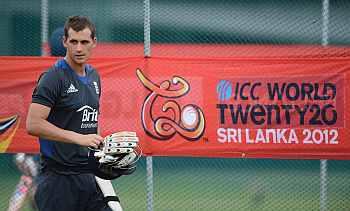It's no secret that Twenty20 (T20) cricket is struggling. The T20 World Cup is almost halfway through and has thus far been a washout.
With few interesting matches on view, and with a diminishing fan base for the shortest variant of India's favourite pastime, even the prospect of winning it all seems to have faded in relevance.
Ironically, the Indian cricket team has set too high a bar for itself by winning the one-day World Cup in 2011 and, following that, soon after with a rise to the top of the Test rankings.
The last year has been one of futility for the most part, and unless India wins the T20 World Cup for the second time, little excitement will run through Indian cricket over the next couple of years.
India has succeeded in cricket without necessarily building a dynasty and this is causing the sustainable organic growth of the business of cricket tremendous problems.
There has been a profound and impactful cultural change in how cricket is perceived today, and, for better or worse, the Indian Premier League (IPL) has much to do with that.
 Yes, it made T20 cricket must-see television, and it now competes with all the general entertainment channels' offerings; even Bollywood doesn't do major releases during those six weeks. The IPL was meant to marry sport with entertainment, creating a reality television culture that, in turn, was supposed to facilitate a trickle-down farming system and career option for aspiring cricketers.
Yes, it made T20 cricket must-see television, and it now competes with all the general entertainment channels' offerings; even Bollywood doesn't do major releases during those six weeks. The IPL was meant to marry sport with entertainment, creating a reality television culture that, in turn, was supposed to facilitate a trickle-down farming system and career option for aspiring cricketers.
Unfortunately, the league is mired in financial uncertainty, and it is never too far away from unsavoury rumours that threaten the integrity of the competition. For instance, the issues surrounding ownership of teams within the IPL, or that the valuations of the once-priceless teams aren't necessarily backed up by industry transactions.
Consider Deccan Chargers. Despite a rumoured price cut of nearly 40 per cent of last year's figures, there seem to be no takers for one of the inaugural teams and a former league champion.
The title sponsorship is up for grabs, too; and sponsorship fees for the central or local revenue pools may not even come close to what the league routinely commanded in the first few years of its existence.
After all, the league-making brands have not yet committed to sponsoring what was, earlier, a slam dunk. In a slowing economy, returns matter more and astute corporations may tag international brand recognition by sponsoring leagues and events abroad or in less pricey sports.
FIFA wants a piece of the Indian pie, and the government has shown a welcome appetite for risk in the post-Commonwealth Games age by encouraging the All India Football Federation to bid for the Junior World Cup. Sports-related investment may surge but in those that make dispassionate fiscal sense.
The IPL, faced with competition from other leagues, will likely lose players to their domestic T20 leagues Australia, England and Sri Lanka have indicated as much.
The product may be diluted, and the competition is borderline ho-hum, but domestic leagues tend to generate interest within their target demographics. Ironically, the biggest beneficiaries of what is undoubtedly an outstanding concept and product are the international cricketers who are now familiar to nearly two billion people in the Indian subcontinent, and who have improved dramatically at the cost of their Indian colleagues.
A case in point is the West Indies team, fancied for the T20 World Cup thanks to a roster developed in large part on Indian soil.
T20 cricket has come full circle from India's first T20 World Cup victory which, unfortunately, means that it could be fast approaching zero.
For cricket overall, each voluntary or involuntary retirement erases yet another superstar that we as Indians have grown up admiring. Meanwhile, as TV fills with other sports' professional leagues, with a long history of genuine competition and tradition, Indian fans' expectations rise.
Even winning big, and consistently, may not be enough for an audience that tires of over-exposure and is accustomed to winning.
Someone, somewhere in the cricket establishment must realise the need to work to sustain the cultural impact that T20 has already created.
Sure, it could happen on its own India could win the T20 World Cup; an unforgettable season for the IPL may set the league back on track. But these are just short-term fixes. T20 cricket needs to create a sustainable brand, by withholding over-exposure and taking a long, hard look at the valuations its gives investors and the benefits it provides fans.
Sponsorship pools need to be justifiable, and instead of trickling down the farming system on good faith, one must create a far deeper talent pool through off-season initiatives that are both meaningful for today's youth and cool enough to keep them engaged.
Without a facelift, T20's cultural dominance may prove ephemeral.
Photograph: Gareth Copley/Getty Images










